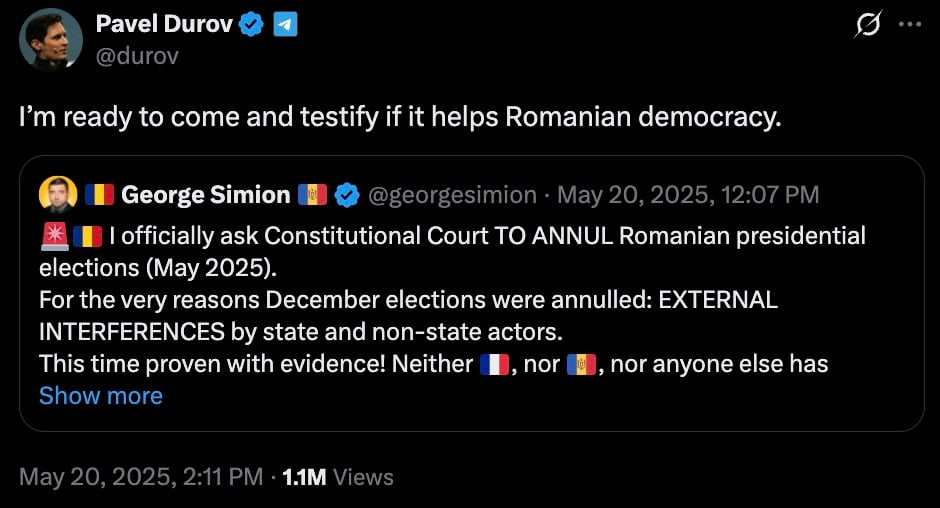Pavel Durov, the founder of Telegram, has offered to travel to Romania to testify in a potential investigation into claims of foreign interference in the country’s presidential election, a vote that has already been mired in annulments, accusations, and international friction.
His declaration came shortly after Romanian candidate George Simion demanded that the results be voided, arguing that the process had been compromised by outside forces. Simion, a nationalist who lost to pro-European contender Nicușor Dan, described the interference as coming from “state and non-state actors,” naming France and Moldova among the culprits. Durov, replying to Simion on X, said he was “ready to come and testify if it helps Romanian democracy.”

The runoff ended with Dan taking 53.6% of the vote, while Simion claimed 46.4%. Simion, however, has refused to accept the result, framing his loss as the product of coordinated external efforts to sabotage his campaign.
Durov’s entry into the fray brings a different dimension to the case. Earlier this year, the Telegram CEO accused Nicolas Lerner, who leads France’s foreign intelligence service, of personally requesting that Telegram remove conservative voices from the Romanian digital space ahead of the election.
Durov claimed Telegram rejected this request.
France’s DGSE denied any attempt to censor political viewpoints, claiming their outreach to Durov was a matter of security and involved “firmly reminding him of his company’s responsibilities, and his own personally, in preventing terrorist and child pornography threats.” Durov responded publicly, rejecting the framing entirely.
According to him, “French foreign intelligence confirmed they met with me, allegedly to fight terrorism and child porn. In reality, child porn was never even mentioned. They did want IPs of terror suspects in France, but their main focus was always geopolitics: Romania, Moldova, Ukraine.”
He went on to challenge the narrative that Telegram fails to act on child exploitation content, outlining a range of tools and initiatives already in place: fingerprint-based filtering, dedicated moderation teams, NGO partnerships, and regular reports on content removals. “Falsely implying Telegram did nothing to remove child porn is a manipulation tactic,” Durov said.
This isn’t Durov’s first confrontation with French authorities. In August of the previous year, he was arrested in France over allegations tied to user activity on his platform. He was released after posting €5 million in bail and left the country by mid-March.
Meanwhile, the election’s legitimacy remains under a cloud. Romania’s initial presidential vote last November saw a surprise win by independent candidate Calin Georgescu.
That result was quickly overturned by the Constitutional Court, which cited suspected Russian meddling. Later reports suggested Georgescu’s momentum may have been fueled by a campaign orchestrated by operatives linked to the governing National Liberal Party, apparently intended to fracture the right-wing electorate. Georgescu was barred from running in the new election.
Romanian officials have again accused Moscow of interference in the recent runoff. Russia has dismissed those allegations, characterizing the electoral process in Bucharest as disorderly and illegitimate.
Durov’s pledge to participate in the investigation has added fuel to a situation already marked by charges of manipulation, censorship, and covert influence.








